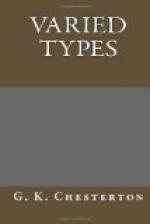In spite of the tiresome half-truth that art is unmoral, the arts require a certain considerable number of moral qualities, and more especially all the arts require courage. The art of drawing, for example, requires even a kind of physical courage. Anyone who has tried to draw a straight line and failed knows that he fails chiefly in nerve, as he might fail to jump off a cliff. And similarly all great literary art involves the element of risk, and the greatest literary artists have commonly been those who have run the greatest risk of talking nonsense. Almost all great poets rant, from Shakespeare downwards. Mrs. Browning was Elizabethan in her luxuriance and her audacity, and the gigantic scale of her wit. We often feel with her as we feel with Shakespeare, that she would have done better with half as much talent. The great curse of the Elizabethans is upon her, that she cannot leave anything alone, she cannot write a single line without a conceit:
“And the eyes of the peacock fans
Winked at the alien glory,”
she said of the Papal fans in the presence of the Italian tricolour:
“And a royal blood sends glances
up her princely eye to trouble,
And the shadow of a monarch’s crown
is softened in her hair,”
is her description of a beautiful and aristocratic lady. The notion of peacock feathers winking like so many London urchins is perhaps one of her rather aggressive and outrageous figures of speech. The image of a woman’s hair as the softened shadow of a crown is a singularly vivid and perfect one. But both have the same quality of intellectual fancy and intellectual concentration. They are both instances of a sort of ethereal epigram. This is the great and dominant characteristic of Mrs. Browning, that she was significant alike in failure and success. Just as every marriage in the world, good or bad, is a marriage, dramatic, irrevocable, and big with coming events, so every one of her wild weddings between alien ideas is an accomplished fact which produces a certain effect on the imagination, which has for good or evil become part and parcel of our mental vision forever. She gives the reader the impression that she never declined a fancy, just as some gentlemen of the eighteenth century never declined a duel. When she fell it was always because she missed the foothold, never because she funked the leap.
“Casa Guidi Windows” is, in one aspect, a poem very typical of its author. Mrs. Browning may fairly be called the peculiar poet of Liberalism, of that great movement of the first half of the nineteenth century towards the emancipation of men from ancient institutions which had gradually changed their nature, from the houses of refuge which had turned into dungeons, and the mystic jewels which remained only as fetters. It was not what we ordinarily understand by revolt. It had no hatred in its heart for ancient and essentially human institutions. It had that deeply conservative




